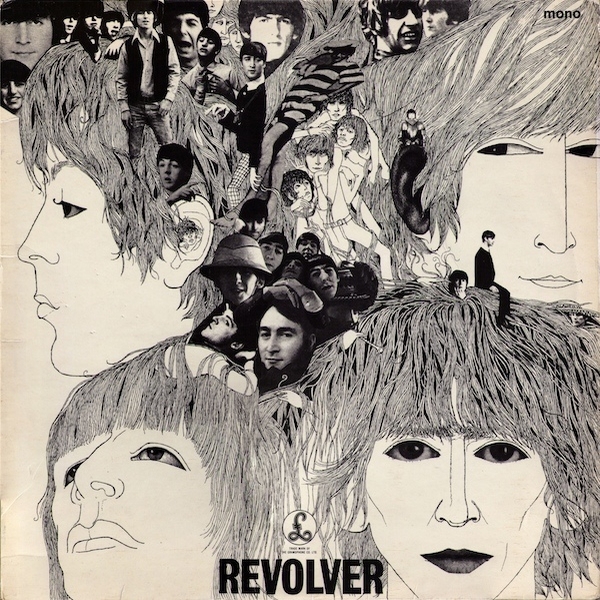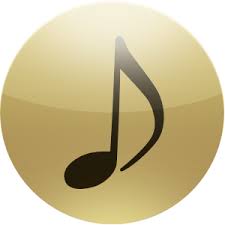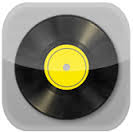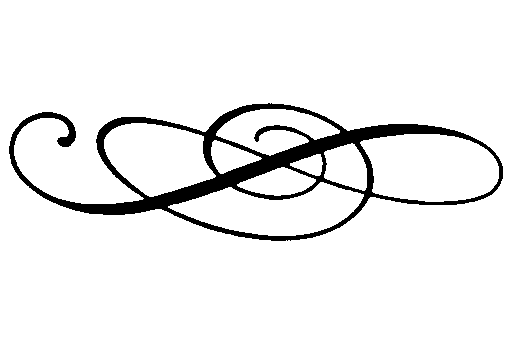

 The Beatles
The Beatles | Release date | Label | Producer | Genre | Length | More info |
| 1966.08.05 | Apple/Capitol | George Martin | Classic Pop Rock | 34:56 |  
 |
Dark shades, electric guitars, hip attitudes: the ultimate Cool Pop album.
Background
A detailed review of Revolver from a general chronological perspective has already been written by me here, so, for the "Important Album Series", here is a somewhat different perspective.
If 1965 was the year that showed the world how rock'n'roll could be taken seriously (Dylan was clearly the most obvious actor on the stage, but far from the only one), then 1966 was the year of "progress or perish": all those nice British Invasion bands from the past three years found themselves facing the challenge of "artistic maturation" or extinction. A hard choice to make, but also, one might think, a lucky one - for instance, it was never offered to any artist from the previous decade, most of whom either fossilized in their original image (like Chuck Berry) or confused maturation with blandness and boredom (Elvis). The Beatles had already begun the process with Rubber Soul (one might even argue for Help!, but the songs there still had fairly conventional structures, lyrics, themes, and moods), but repeating Rubber Soul in 1966 would already have been a mistake. The record was not loud or proud enough, did not properly reflect the band's psychedelic experiences, and still had quite a fair share of "simple love songs". With Revolver, even the simple love songs wouldn't be quite so simple any more.
The recording of Revolver also correlates with the Beatles winding down their activities as a touring band: it is interesting that, even though the band's last brief US tour in August '66 coincided with the release of the album, not a single song from it was ever played live, as they probably did not even go through the trouble of rehearsing any of the material. Actually, they had not yet entered the era of truly wild studio experimentation, so apart from ʻTomorrow Never Knowsʼ and whatever had any sitar or string ensembles on it, the songs were very much playable: Revolver does not particularly give the impression of a "hooray, we're done with having to do this live, and now our hands are truly untied!" kind of album. But it does give the impression of an album that is very conscious of the times of change that the band was living in, and it is arguably the first Beatles album that may have been conceived on a genuinely competitive basis, if not specifically with the Beach Boys (whose Pet Sounds came out during the recording sessions for Revolver), then with the quickly developing intellectual rock music market in general. And nothing could be better for the Beatles than a good challenge.
Some basic factsThe sessions were held from April to late June of 1966, with the album's most progressive-experimental last track (ʻTomorrow Never Knowsʼ) actually recorded first; you can hear some of the outtakes on Anthology 2 to get a sense of how things gradually developed over time. Upon release, the record dutifully went to the top of the charts and is, right to this day, generally acknowledged as either one of the greatest or the greatest Beatles album ever, period - its high status is probably explained by the fact that it offers the listener the best of both worlds: on one hand, it is still a tight, concise collection of 14 no-nonsense (well, mostly no-nonsense) pop rock songs with loud electric guitar melodies, but it is also quite evidently and self-consciously "artsy", trying to invoke deeper, subtler emotional responses and consistently hitting upon not-so-trivial topics. In particular, the somewhat insane critical backlash against Sgt. Pepper, which we witnessed around the turn of the millennium, tends to usually not get carried over to Revolver - which, I believe, has not so much to do with the lack of "McCartney whimsiness" as it has with rock fans complaining that "Sgt. Pepper is not really rock music". But arguing over which one is really the greatest, Revolver or Sgt. Pepper, is a pointless occupation anyway.
For the
defense
Buoyant: Have the Beatles (or any other band, for that matter) ever written and recorded anything as simplistic-optimistic as ʻGood Day Sunshineʼ? One of those cases where McCartney's bare-basic lyrics ("I love her and she's loving me") work to absolute perfection, so totally adequate with the music. Funny thing is, it's really vaudeville, but because of the strong rock rhythm section, it somehow feels more direct and sincere than vaudeville. There's some downright martial joviality here - I like to imagine a squad of soldiers chanting this on a march from boot camp.
Cocky: I think John later waved away ʻAnd Your Bird Can Singʼ as a bit of the usual nonsense, but he was just starting work on his "I'll tear yours-and-everybody-else's mask down" persona, and this song seems clearly influenced, mood-wise, by the likes of Dylan's ʻQueen Jane Approximatelyʼ. The guitar riff is catchy, but the mood is mostly set by the vocals - particularly the contrast between the arrogant "you don't get me... you can't see me" and the ultimately condescending "I'll be round, I'll be round". Maybe in retrospect the song lost its appeal to the author because the sentiments would be expressed more directly in his subsequent stuff, but I dunno, he sounds pretty sincere on this one.
Dazed: George's ʻI Want To Tell Youʼ is one of those sleeping masterpieces for which you may want to work up a feel. But do watch out for that piano - it's minimalistic in an almost John Cale manner of things, but totally meaningful, with the notes representing that throbbing feeling in your head, you know, when you feel yourself on the verge of some major feeling or breakthrough, but can't really tell what it is. So many songs about frustration, confusion, impossibility to express oneself in that era (ʻI Can't Explainʼ, etc.), but how many of them had melodies specifically tailored to reflect those feelings? This piano part, burning with tension that never finds a proper way to get resolved, is just the shit.
Drowsy: ʻI'm Only Sleepingʼ - the best ever song, bar none, written about... sleeping. How many people are there in the world for which it could become a personal anthem? (Count me in). The lethargic voice, the little yawns, the lazy stops and disgruntled starts, the messy backward solos, it all adds up.
Kiddie: Okay, so ʻYellow Submarineʼ is hardly the best Beatles song ever written, but it's arguably the best Beatles song written for children. They gave all sorts of light throwaways to Ringo before, but it is cute that it took their first altogether-serious album to feature their first song specifically targeted for the under-12 market. Anybody who thinks the song brings down the overall quality of the album should immediately get back in touch with that inner child, or all is lost.
Melancholic: ʻFor No Oneʼ is McCartney's first stab at deep psychologism (although early hints of that may be detected already on ʻThings We Said Todayʼ), and the French horn solo is an excellent means to help the song avoid excessive sentimentality. Sometimes I can't help but wonder how in the world a guy who, by all accounts, has generally had a comfortable life and was never known much as a loner or sociopath could have such a brilliant knack for picturing desperate loneliness (one emotion that he usually captures better than Lennon, who is always snappy-aggressive about it: remember how even ʻIsolationʼ turns to snap-and-bark in the middle?).
Mournful: You could say that ʻEleanor Rigbyʼ feels a little too... staged, maybe, with the chorus vocals feeling a little distant and the string arrangement a little too "academic" and, besides, who the hell is "Eleanor Rigby" anyway for us to care? But this is why I stash this under "mournful" rather than "melancholic" - ʻFor No Oneʼ is intimate empathy for a living person, whereas ʻEleanor Rigbyʼ features the protagonist glancing at a tombstone and trying to recreate the gloomy past from the silent present. This does call for a little bit of solemnity and maybe even detachment.
Pissed-off: Wasn't ʻTaxmanʼ the band's first truly "socially conscious" song? All the more ironic to hear it stem from George, whose "spiritual" image has very much obscured the obvious truth - he, too, was a human being, and didn't have much of an issue with living in the material world. Anyway, they wanted an angry riff, and they got an angry riff - so angry that it would later be lifted by punk bands throughout the late Seventies - and it also gave Paul the opportunity to provide a guitar solo that combined garage rock fury with a nifty Indian touch. Since we'll never hear Ravi Shankar playing ʻTrain Kept A-Rollin'ʼ, that's about as close as you'll get there.
Spellbound: ʻTomorrow Never Knowsʼ does sound like the band, and particularly the lead singer, have a trance spell cast over them, doesn't it? It's so blatantly "cosmic", so seemingly obvious and repetitive compared to whatever Pink Floyd were doing at the same time, that I can understand all the snobbish indignation. The only problem is, it frickin' works.
Tender: Every now and then, I feel like ʻHere, There, And Everywhereʼ might be the album's greatest achievement, in a way. We all like to cringe our noses at McCartney's sugar-sweet ballads (particularly in solo times) - well, there's hardly even one ballad in his catalog that has as much sugar-sweetness as this song, and yet it feels so totally natural. It must be the voice, of course. People have written on how the lyrics are so well integrated with the music, with the "changing my life with a wave of hand" line reflected by melodic modulations, but my own favorite line has always been about "running my hands through her hair", because that is precisely the overall feel of the song. It epitomizes, maybe even absolutizes the very idea of tenderness with a melodic structure and an atmospheric arrangement that, even if Paul did say it was inspired by ʻGod Only Knowsʼ, is unparalleled; there's just no other ballad in the world that sounds quite like this (although Paul himself did come close one more time with ʻI Willʼ - a much simpler and less intimate tune, though).
For the prosecution
As you can see, four songs have been left out of the equation - not because they're bad or anything, but because I find it harder to associate them with any particular vibe. Well, ʻGot To Get You Into My Lifeʼ can also qualify for "buoyant", but the very idea was to demonstrate the "one song, one mood" principle, and ʻGood Day Sunshineʼ beats it with the simplicity criterion (achieving the same effect with fewer means). ʻLove You Toʼ is much too Indian to tickle my disgustingly European emotional center. And then there are the other two Lennon songs...
...see, here's the problem: both ʻDoctor Robertʼ and ʻShe Said She Saidʼ are supposed to relate to drug experiences, and both have interesting melodies, particularly the latter, but emotionally, they don't really have the same power or adequacy as the rest of Lennon's songs on the album. Essentially, they just relate their issues over guitar patterns that may be more or less complicated, but are not particularly "psychedelic" or "atmospheric". The line "She said I know what it's like to be dead" is a great opener, sure to generate plenty of press and all, butit isn't really sung in a way that would really convince you of something like that. So ʻShe Said She Saidʼ may technically be a great piece of music (Ringo's drum patterns alone are worth a million on that one), but looking from a purely emotional perspective, it doesn't quite cut the mustard.
Conclusion
| Melody |
Voice | Mood | Production | Innovation/Influence | Where it belongs | RYM preference | |
 |
 |
 |
 |
 |
 |
#8 (Feb 21, 2016) |

| Previous entry | Main page | Next entry |